Dental Crowns – Marshall, TX
Renew Your Teeth’s Form and Function

A dental crown is a type of restoration dentists have been using for decades to address a variety of problems. Most often, it is used to repair a tooth that has been damaged due to extensive decay or injury. It can also be used to protect a tooth from the buildup of food and bacteria on it, protecting it from tooth decay. Plus, it can be essential to helping your teeth fit together properly if they do not already. Dental crowns are one of the most reliable restorative solutions available today, and fortunately, you can get them from Dr. Charles Parker .
Why Choose Marshall Denture Clinic for Dental Crowns?
- Variety of High-Quality Materials
- Dentist with 40+ Years of Experience
- State of the Art Technology
What Is a Dental Crown?
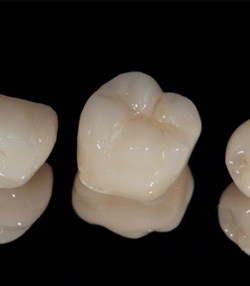
A dental crown is a type of restoration that simply fits over the top of your natural tooth like a cap. Your crown will be custom-designed to fit in well with the surrounding dentition and provide you with a comfortable bite and reliable function.
Crowns can be made from a variety of materials including ceramic, porcelain fused to metal, and gold. The material Dr. Parker chooses to use will depend on which tooth he is restoring. The front teeth, which are seen whenever you smile, would probably be served best by ceramic crowns because they are the most aesthetically similar to your natural teeth. In fact, they can be specially shaded to match the rest of your smile. The back teeth need to be especially strong, so if these teeth need to be repaired, Dr. Parker will probably recommend a gold crown. It all depends on the needs of your teeth, as well as your personal preferences. In any case, your crown will give you a beautiful, functional smile you can rely on day to day.
Here is more information on the most popular crown materials:
Ceramic
Ceramic, which is sometimes simply called porcelain, is quite strong and durable. It is even extremely resistant to stains due to its nonporous nature. Patients who are concerned about aesthetics, as well as those with metal sensitivities, usually opt for ceramic crowns. These restorations have the potential to last for a decade or longer.
Porcelain Fused to Metal (PFM)
A PFM crown consists of a thin metal lining, which is surrounded by a porcelain outer shell. Hence, the crown offers all the strength of metal and much of the beauty of porcelain. However, sometimes the metal lining of the crown can become visible, which makes PFM crowns slightly less aesthetically pleasing than 100 percent ceramic ones.
Gold
Although several different types of metals can be used to craft dental crowns, gold is often the best choice. Not only is it incredibly strong, but it also has a very low risk of damaging the opposing teeth. And since gold is a noble metal, it will not corrode. It is even safe for most patients with metal allergies.
Who Is a Good Candidate for Dental Crowns?

You may benefit from a new dental crown if:
- One of your old crowns is broken, bent, or otherwise damaged.
- One of your teeth has recently undergone root canal therapy.
- You have cracked tooth syndrome.
- A tooth is badly misshapen, which affects your ability to bite comfortably.
- You wish to reshape a tooth for purely cosmetic reasons.
- You have a large cavity, and a filling alone is not adequate to repair the tooth.
- You have missing teeth (crowns can be used as part of a bridge or in conjunction with dental implants to fill in gaps in a patient’s smile).
The Dental Crowns Procedure
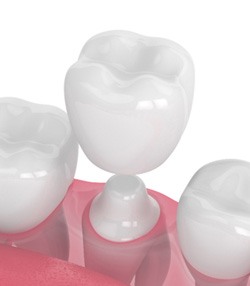
The first step to getting a crown is to make an appointment at our office. Dr. Parker will examine your teeth and see if a dental crown is the right solution for your smile. If it is, the process of designing and placing your crown can begin:
- Dr. Parker will prepare your tooth so it can properly fit beneath a crown.
- His team will take an impression of your teeth and send it to a local dental laboratory, which will then fabricate your crown.
- You will wear a temporary crown for a while. Then, you will return to our office so our team can cement your permanent crown into place.
The entire process can usually be completed over the course of two appointments. Once your tooth has been fully restored, it may feel slightly sensitive for a week or so, but you will be able to use it just like your other teeth when you are speaking or eating.
The most common reason for dental crown failure is because the tooth beneath the crown starts to decay, so it is paramount that you stick to a good oral care routine. Consistent brushing and flossing, along with regular check-ups by Dr. Parker, will help your crown stand the test of time.
Benefits of Dental Crowns

Dental crowns have helped generations of patients to enjoy improved oral health. Over the decades, the process of designing them has evolved, and materials have advanced as well. Indeed, modern dental crowns are more beautiful and functional than ever before. But what specific benefits do they provide? Below, you will discover the answer to that question.
A Beautiful Appearance

Dental crowns can be made of various materials. While the ones that are made of metal tend to stand out against their surroundings, other types of crowns blend in seamlessly with the nearby dentition. For example, Dr. Parker carefully shade matches all-ceramic crowns so they are virtually indistinguishable from the natural dental enamel. The ceramic material even reflects light in a manner that is similar to that of natural teeth. Porcelain-fused-to-metal (PFM) crowns can also be quite beautiful.
A well-made dental crown can totally transform the appearance of a broken, damaged, or otherwise misshapen tooth, helping a patient to enjoy a truly lovely smile.
Restored Chewing Ability

Damaged and decayed teeth do not function as well as they should. Indeed, when you try to eat with them, you may experience significant sensitivity and pain. You might even avoid certain foods. A dental crown can correct such issues. It surrounds the entire portion of a tooth that is above the gum line, thus helping it regain its strength and its ability to help you chew practically any food. A carefully made crown can also help to bring your bite into harmony, resulting in less stress on your surrounding teeth and on the muscles that control chewing function.
Protection for the Tooth
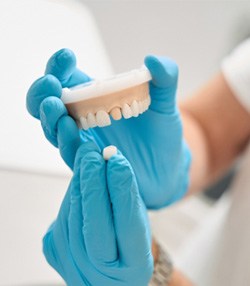
A damaged or decayed tooth is at risk of incurring further harm — unless it has a crown to protect it. A crown stops food particles and bacteria from irritating a vulnerable tooth. It also serves as a shield against hard or crunchy foods that might otherwise break a damaged tooth. The protection that a dental crown provides is truly invaluable. In fact, this type of restoration has the potential to help you keep your natural teeth — even ones that have suffered some damage — throughout your lifetime.
Versatility
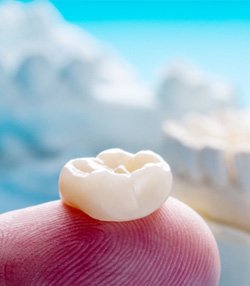
The primary purpose of dental crowns is to restore the shape and function of damaged teeth. However, that is not all they can do. When a dental crown is placed on top of a dental implant, it helps to replace a missing tooth altogether. Dental crowns can also support traditional dental bridges in order to replace lost teeth. Also, while most patients receive dental crowns to benefit their oral health, there are some instances where crowns can be used to fulfill a purely cosmetic function.
Understanding the Cost of Dental Crowns

As with any dental procedure, the final cost depends on a number of different factors, and that definitely applies to dental crowns. These are some of the most commonly used restorations in all of dentistry, and if you’re in need of one, cost is likely on your mind. What should you expect to pay? What could make it more or less expensive? Will your insurance cover any of it? This next section will tell you everything you need to know about the cost of dental crowns.
Factors That Affect the Cost of Dental Crowns
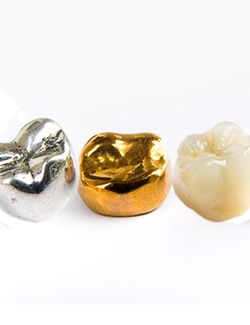
The price range for crowns is quite wide, averaging about $500-$3,000 per tooth. Why is it so broad? Well, there are a few factors that need to be considered, including:
- Material Used: Metal crowns, which are durable and less natural-looking, cost less than all-porcelain crowns, which more closely resemble real teeth. In most cases, a dentist will use a metal crown to repair a back tooth and a porcelain crown to repair one in the front. There are also porcelain fused to metal (PFM) crowns that cost somewhere in the middle.
- The Need for Additional Procedures: Are you getting a crown after a root canal or to complete a dental implant treatment? Do you need gum disease therapy before your crown can be placed? All of these procedures ensure that a crown can be safely used, and they will add to the overall cost.
- The Training/Experience of the Dentist: An experienced dentist who is able to handle more complicated restorative procedures will typically charge more than a doctor who is fresh out of school. In this situation, paying a little more will usually lend itself to a much better final product, which will help you save money on replacement costs in the future.
Does Dental Insurance Cover Dental Crowns?

While every dental insurance plan has unique benefits, it is very standard for them to offer at least partial coverage for restorative procedures, including crowns. On average, an insurance plan will cover about 50% of the cost.
At our office, we’re happy to accept all insurance plans and do everything we can to maximize our patient’s benefits. If you’re interested in getting a crown and want to know how your insurance will help you pay for it, just give us a call, and our experts will be ready to go over your policy with you.
Options for Making Dental Crowns Affordable

If using insurance isn’t an option for you, our practice can also help you get financing. Many of the payment plans we accept have little to no interest, and it’s easy to find one that breaks up the cost in a way that fits your budget. Give us a call to learn more about your options.
In the end, the best way to determine your actual final cost for a dental crown is simply to come see Dr. Charles Parker here at our office. After a brief exam, he’ll be able to give you a more concrete idea of what you should expect to pay, and after that, our team will work with you to figure out a plan to make it very affordable.
Dental Crown FAQs
Are Dental Crowns Permanent?
Dental crowns aren’t technically permanent. However, they are a long-term solution for damaged teeth. In fact, they can protect your tooth for anywhere between 5 to 15 years. When your dentist reshapes your tooth for a crown, that procedure is irreversible. Tooth enamel doesn’t grow back after it has been removed. For this reason, the tooth will always need to be protected by a crown going forward. That being said, crowns protect the underlying tooth from additional damage, so they can help the tooth to survive for much longer than it would have otherwise. You can keep your crown in great shape by maintaining an excellent oral hygiene routine and seeing your dentist for regular cleanings and checkups.
How Do You Know When a Dental Crown Needs to Be Replaced?
The only way to tell for sure when a dental crown needs to be replaced is to have X-rays taken or to have it visually examined by a dentist. Here are some of the most common warning signs that indicate that a dental crown is at the end of its lifespan:
- Pain: If there is any decay beneath the crown, it should be removed so the tooth can be treated.
- Unstable: If your crown feels loose, especially when chewing something sticky, you should contact your dentist.
- Appearance Changes: If your crown is chipped or discolored, it can negatively affect your self-confidence. This is a valid reason to have it replaced.
- Dark Line: If you notice a dark line around the base of your dental crown, it is often because you have a porcelain-fused-to-metal crown. While they are very effective, this can indicate that the crown has been through some wear and tear.
Does It Hurt to Get a Dental Crown?
Many patients worry that their treatment will be painful. Fortunately, the first step is always to numb the area with a local anesthetic. This way, you won’t feel a thing! Your mouth may exhibit some soreness for a few days after your treatment, but this can be managed with over-the-counter pain relievers. If you have any concerns, don’t hesitate to contact us. Remember that crowns protect vulnerable teeth from damage, so they can help prevent pain in the future.
Do Dental Crowns Feel Natural?
Within a few days of getting your dental crown, it should start to feel more and more natural. Crowns are made from durable materials that can stand up to everyday chewing forces just as well as your tooth enamel, so you shouldn’t feel any strangeness when eating. When you get a dental crown, your dentist reshapes the tooth to ensure that the restoration fits comfortably in your mouth. Additionally, each crown is customized based on impressions. Ultimately, your crown should feel just like a natural tooth.
Do Dental Crowns Get Cavities?
Dental crowns use man-made materials, so they can’t get cavities. That said, the teeth underneath them still can.
You see, a crowned tooth can decay like an uncrowned one. Poor oral hygiene could let plaque form around your gumline, steadily building up over time. Bad bacteria would then reach beneath your crown and further decay your tooth.
Given these facts, you should remember to practice good oral care. You can prevent cavities in crowned teeth by brushing twice daily, flossing once daily, and seeing your dentist often. From there, you won’t have to worry about surprise instances of tooth decay.
Are Dental Crowns Safe?
So long as it’s placed by an experienced dentist, a regular dental crown is quite safe. Treatment won’t harm your teeth, gums, or the rest of your mouth, nor will the cap itself.
For starters, the dental crown process won’t compromise your oral health. Your final restoration will make up for the enamel lost during treatment. That way, you won’t have a higher risk of tooth sensitivity or infection than you did before.
At the same time, today’s dental crowns use proper materials. Metallic ones don’t contain mercury; they won’t give you any toxicity issues. Similarly, crowns made of ceramic and porcelain are also 100% toxin-free and shouldn’t cause problems.
Of course, it’s always better to be safe than sorry. Call us right away if you experience any gum irritation, redness, etc. When you have such symptoms, you may be facing an allergic reaction.
What Happens If You Wait Too Long to Get a Dental Crown?
Note that a qualified dentist will only suggest a dental crown when you really need one. That being the case, putting off treatment would be risky for your tooth and oral health.
Remember, a damaged tooth without a dental crown is exposed to outside forces. Leaving it alone means it’ll suffer from chewing forces, food debris, and bacteria. If that should happen, the tooth will become so compromised that you’ll need a root canal or an extraction.
To avoid the need for expensive care, try to get a dental crown soon after your dentist suggests it.
Can Dental Crowns Be Whitened?
Sadly, dental crowns can’t be directly whitened through dental work. Treatment would leave them the same color as before, no matter their material.
The issue comes down to how whitening works. On uncrowned teeth, bleaching gel can enter your enamel’s tiny pores and break apart surface stains. In contrast, dental restorations like crowns lack pores for the gel to pass through. That means they can’t be affected by the whitening process.
Still, you can work around the crown-whitening problem. The best option is to get your teeth whitened before having a dental crown placed. That way, your final crown will match your smile’s preferred shade.
 Request A Free Consultation
Request A Free Consultation
